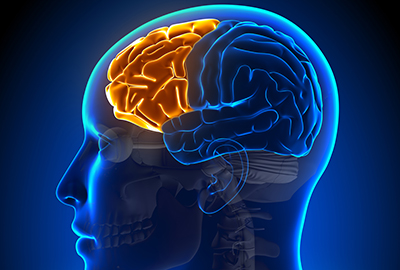Article
Strengthen Your Prefrontal Cortex

The prefrontal cortex is key to our success and well- being. It’s really the CEO, or happiness center, and overall thought orchestrator of the brain. It’s been shown to be underactive in people with many mental health issues, including bipolar disorder and depression. This is devastating since the prefrontal cortex is a kind of surge protector, which helps to modulate the responses of the amygdala. A strong amygdala and weak prefrontal cortex means we can easily have anxiety that originates from our thoughts and freak out about things that aren’t even happening. It’s almost like the amygdala is watching cortex television, similar to the Pixar’s kids movie Inside Out, and reacting to our various imaginations, many of which are about the past or future.
The best way to strengthen your prefrontal cortex is to meditate.
In veteran meditators, the cortex has weaker connections to the amygdala, making it less likely for any hard-wired reactivity to overwhelm the logical part of the brain. Conversely, meditation strengthens the attention centers of the cortex, which creates a distance from anxiety. This allows us to experience anxiety with less judgment and drama.
Meditating also has cognitive benefits; you think better. This is why meditation and mindfulness training are becoming much more popular and valued in corporate environments and I’m asked to do it frequently. It can’t be considered a “nice to have” for executives; it’s a must have. Think of the phrase, the “corporate athlete”. Most of us are not evaluated in the workplace based on our physical strength. Most of us are immersed in knowledge work— processing information and making decisions. We’re using our brain.
David Allen, the creator of the time management method known as “Getting Things Done,” says, “Your ability to generate power is inversely proportional to your ability to relax.” Since our brains are the most important determiner of our workplace success, what are we doing to train it, or to improve it? For far too many people, the answer is nothing, or not enough. Specifically, meditating boosts the executive functions of the frontal lobes to include ability to manage time, pay attention, switch focus, plan, organize, concentrate, remember details, and control impulses. Don’t we all need more of those abilities in today’s workplace?
- March 2025
- January 2025
- September 2024
- July 2024
- May 2024
- March 2024
- December 2023
- October 2023
- August 2023
- June 2023
- April 2023
- March 2023
- January 2023
- October 2022
- September 2022
- July 2022
- May 2022
- March 2022
- January 2022
- November 2021
- October 2021
- August 2021
- May 2021
- April 2021
- February 2021
- January 2021
- November 2020
- October 2020
- August 2020
- June 2020
- May 2020
- April 2020
- April 2018